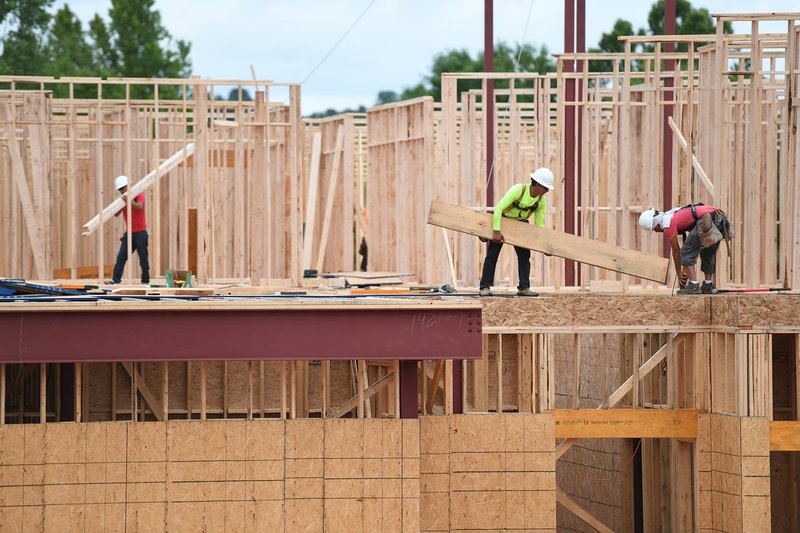The extraordinarily low unemployment rate that draws thousands of newcomers to Northwest Arkansas and could be lifting wages is approaching record levels, new federal data show.
About 2.2 percent of the Fayetteville-Springdale-Rogers metropolitan area's labor force was out of work in April, according to the preliminary count from the U.S. Bureau of Labor Statistics. That's down from April last year and the lowest level since the region reached a rock-bottom 2.1 percent almost two decades ago.
Unemployment rises and falls
Northwest Arkansas’s unemployment rate has dropped farther than pre-recession levels, hitting the lowest level since the 1990s.
Year;2007;2008;2009;2010;
2011;2012;2013;2014;2015
;2016;2017
Unemployment rate (percent);3.5;3.7;6;6.3;6.3;
5.5;5.4;4.3;3.8;2.6;2.2
(preliminary — could be revised)
Source: U.S. Bureau of Labor Statistics
Some people will always be between jobs, and economists consider a typical unemployment rate to hover around 4 percent or 5 percent. The national rate is a little above 4 percent, and Arkansas in April was at 3.5 percent. That Northwest Arkansas' rate is so much lower and still falling means companies are snapping up the area's employees faster than people enter the job hunt or arrive in the area.
Put another way, there are more jobs to be done than people who want to do them, despite being in one of the country's fastest-growing metros.
Crazy times
"It's crazy right now," said Sara Staley, market manager for the staffing company Staffmark in Bentonville. "We're just all trying to find ways in which to recruit those candidates and get those good people in the door."
The last time Northwest Arkansas was in similar territory was 1999. Then, as now, the Hispanic population was booming, though the group numbered around 20,000 instead of today's figure four times as high. Experts worried big industries would be reluctant to come here because of the lack of ready employees.
Employers already here were so desperate for people that some fast-food restaurants offered $200 signing bonuses and school districts struggled to find enough substitute teachers.
Today, fast-food, health care and construction companies said they're hiring qualified people about as fast as they can find them. Staley said one chicken restaurant last week gave her a slip of paper advertising starting pay of $13 an hour along with her drive-thru order.
Construction crews are building neighborhoods, hospitals and roads throughout Northwest Arkansas, yet the industry's jobs grew only slightly from 10,400 in April 2016 to 10,700 this April, according to the Associated General Contractors of America. The change put the region firmly in the middle of the pack among the country's metropolitan areas.
"It's not easy, not as easy as it used to be" to find workers, said Pedro Fimbres, co-owner of A&P Concrete and Pools in Fayetteville. The 4-year-old company has about 20 employees, including Fimbres's father.
"We're trying to add more, but it's hard to keep up," he said.
The outfit is constantly working jobs throughout the region and is booked for weeks, Fimbres said. The company often hires painters and other non-concrete laborers and trains them. But his struggle to find more workers isn't only a lack of people, he said -- it's a lack of the needed skill and strength. He sometimes hires inexperienced people and pays them more than he otherwise would because he urgently needs another pair of hands.
"If I wanted to, I could pick up the phone and hire 10 guys right now, but none of them are going to have the skill set we need," Fimbres said.
Job Hopping
Hospitality and warehouse companies are also shorthanded, Staley said. She added many of the people who come to Staffmark for work are "job hopping" in pursuit of better opportunities.
"If it pays 50 to 75 cents more an hour, they're going to check that out," she said. "Companies that are unwilling to compete pay-rate-wise are probably the ones struggling the most."
The region's income generally ticked upward in recent years, reaching a median salary of $30,400 in 2015, according to the latest Census estimate. But that was essentially unchanged from 2014. Several factors could be absorbing some of the added income that would be expected in such a tight job market, said Mervin Jebaraj, interim director of the University of Arkansas Center for Business and Economic Research.
First, thousands of people move here each year. The Census reports migration, mostly from other parts of the country, has outpaced local births since 2014. More than 7,800 people moved to the area from mid-2015 to mid-2016, compared to almost 7,300 births. The flow of people could release some of the pressure to raise wages and compete for employees.
The need for workers might also be pulling people who haven't worked in years into the labor force, a number that factors into the unemployment rate, Jebaraj said. The proportion of people 16 or older who are working or looking for work still hasn't fully recovered from the Great Recession a decade ago, but it's ticking upward slightly again in Northwest Arkansas and the country, according to the labor bureau and Census.
Finally, the region's public school districts, post-secondary schools, chambers of commerce and businesses are banding together to bring attention to the most needed jobs and how to get them. Many of the partnerships emphasize middle-skill positions, such as nurses or welders or chefs, that need training past high school but don't require a bachelor's degree.
Such jobs often pay salaries comparable to other professions. Some stigma surrounds them, educators and others have said, but the jobs are worthwhile and attitudes are slowly shifting. Fimbres said the accomplishment of building homes' foundation or other projects is worth the physical labor.
"The real disconnect is convincing people that those are jobs that they want to do," Jebaraj said.
The nonprofit Northwest Arkansas Council's 2016 business survey found dozens of companies couldn't find enough skilled workers. But the concern has become less intense than past years, with fewer reporting unfilled positions.
NW News on 06/04/2017

